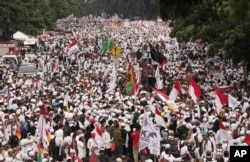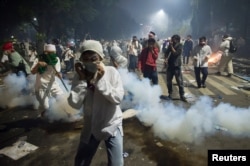In May 1998, Abui, a Chinese-Indonesian canteen owner, had a two year old daughter and another on the way. He and his pregnant wife didn’t dare sleep through the night; they took turns on the night watch for five days as rioters ransacked Chinese shops and neighborhoods. It was part of a hectic month of racially charged protests that wracked Java and Sumatra shortly before the collapse of Suharto’s New Order government.
Having lived through that, Abui has been relatively unruffled by the civic unrest of recent weeks, which climaxed in a huge rally on November 4 against Jakarta’s ethnic Chinese governor, Basuki Tjahaja Purnama, known as Ahok.
“Look, in 1998, we had no idea how bad it would get. At least this time, they announced the protest far in advance so we knew to stay indoors,” he said at his canteen in Pluit Village mall in an ethnic Chinese enclave in North Jakarta. “There’s been anti-Chinese sentiment for years. We aren’t too bothered by mass protests as long as the police keep us safe.”
Still, the riots in North Jakarta on the evening of the anti-Ahok rally made him nervous. He had made the mistake of letting his daughter go to the movies, he said, and he demanded she come home in case the rioters spread out. If there are any more protests this month, he and all his Chinese Indonesian friends plan to lock themselves in their houses.
The racially charged discourse surrounding the Ahok protests has made anti-Chinese sentiment more explicit than it has been since 1998. And if it boils over, it has potential to erode some of Indonesia’s recent advances in embracing Chinese culture after centuries of suppression.
Sectarian differences
“The radicalization and Islamization of Indonesian politics has been going on for a while, although the anti-Ahok movement made the situation worse,” said Leo Suryadinata, a scholar of Chinese-Indonesian culture at the Singapore-based Institute of Southeast Asian Studies.
“As I see it, this is an ongoing struggle between the old forces and the ‘reformists.’ The old forces try to continue to use both Islamic and ‘Chinese’ issues as they don’t have anything else to play on,” he said.
One of, but not the only, charges levied against Ahok, who is also Christian, is the idea that a non-Muslim politician should not lead the Muslim-majority province of Jakarta. This is largely an incendiary position by hard-line Islamist groups like the Islamic Defenders Front (FPI). Many others oppose him on non-religious grounds, due to his aggressive land eviction policies.
Racism is just one of four distinct motives of the anti-Ahok protest, according to Human Rights Watch researcher Andreas Harsono. The others, he told VOA, are “land eviction; political interests due to the incoming local election; and sectarianism, circling around the so-called blasphemy charge against Ahok, which, by the way, is a controversial article that many would like to be scrapped from the Criminal Code.”
“These events are not normalizing the anti-Chinese racism in Indonesia, so much as they are a reminder that anti-Chinese sentiment is always used to gain political interest in Indonesia, especially in Java,” said Harsono.
Young people
Still, for many young people with scant or no memory of the 1998 riots, the uptick in anti-Chinese sentiment has been uncomfortable to observe.
“I have never experienced something like this before,” said Handy Susilo, a writer and translator in Jakarta. “I feel that they are not just exploiting ethnic differences, but also religious differences.”
The worst discourse, he said, is on social media, where young people have been emboldened to fan racist flames under the context of discussing politics.
Although ethnic Chinese Indonesians are just 1.2 percent of the population, some of them have enjoyed great business success – they account for more than half of Forbes’ top 20 richest Indonesian business owners – which has engendered some resentment and cultural repression over the years.
In 1966, a newly elected Suharto banned Chinese names, the teaching of the Chinese language and celebrations of Chinese festivals. President Abdurrahman Wahid walked back these measures when he was elected in 1999, allowing, for instance, the public celebration of Chinese New Year and even declaring it a national holiday in 2003.
For young Chinese-Indonesians like Vivian Marlin – the then-unborn daughter who kept Abui up all night in May 1998 – this has been the status quo their whole lives. Recent ethnic tensions are showing them how fragile that state might have been.
“I’m not worried for my safety, but it is strange that people feel comfortable voicing anti-Chinese statements so publicly now,” said Marlin, who is now a college freshman.
The effects of rhetoric
The problem with racist rhetoric, of course, is that it’s often translated into violence.
There was a small taste of that threat on the evening of November 4, when a faction of protesters looted the Chinese neighborhoods of Penjaringan and Luar Batang in North Jakarta.
“They probably vented their anger and racism against presumably Chinese-owned businesses and homes in the area because they were prevented from attacking Ahok’s home, which is in the area,” said Harsono. “It was obviously a serious crime.”
If there are more protests in this vein – and one is tentatively scheduled for November 25 – it’s likely that the threat of violence in North Jakarta will redouble. It could be a vicious cycle because there’s no guarantee that the protests or rhetoric will subside after the gubernatorial election in February 2017.
“Racially charged dialogue, in fact, has never really disappeared in Indonesia,” said Suryadinata. “It is a useful tool for Indonesian politicians to use when needed, especially, but not only, during elections.”






